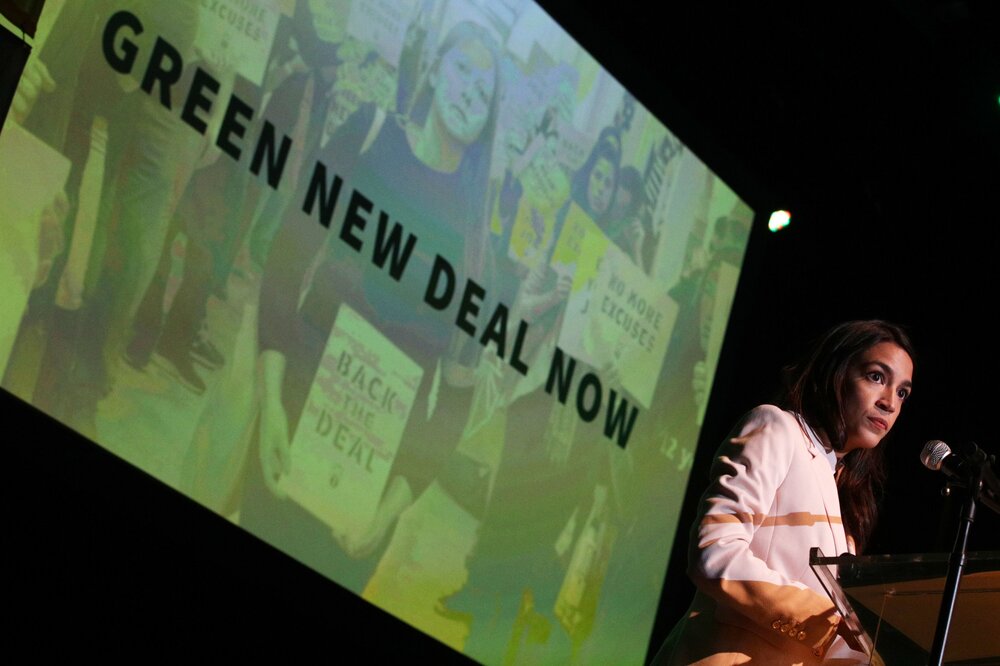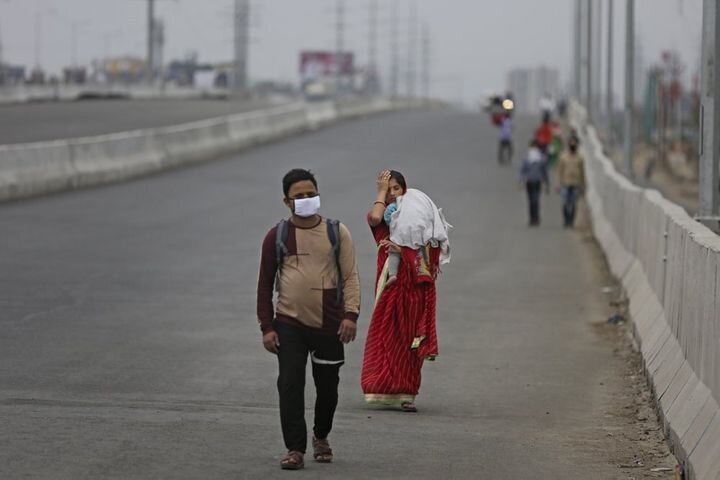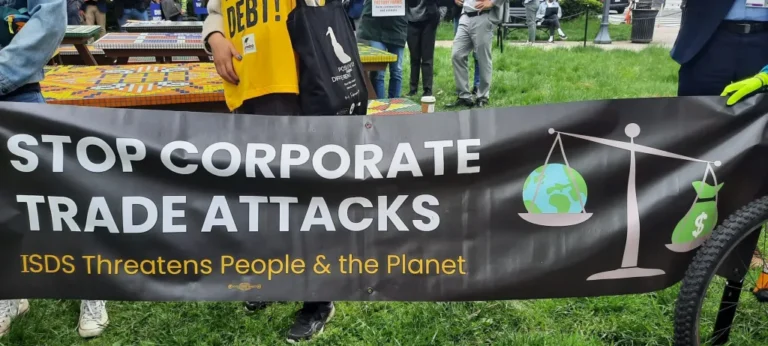A GND which fails to challenge the hegemony of growth-led development perpetuates the exploitation of the Global South and will be unable to prevent global ecological social collapse
In Part I of this two-part article, we discussed various proposals for a Green New Deal (GND) advanced by progressive forces in the Global North, in terms of their impact on the Global South. We discussed the cost-shifting imperative in capitalism, historical and ongoing practices of imperialist resource extraction and rising ecofascism. Here, in Part II, we discuss how a GND will reinforce “business-as-usual” if it fails to encompass the Global South, and if it does not take clear positions against capitalism, statism, and patriarchy. We also offer alternatives to development that a globally-integrated GND could draw inspiration from.
A more efficient Old Deal
The concerns mentioned in Part I about rising (eco)fascism, far-right movements and global capital’s response to the GND are interlinked. While collapsing these three interest groups risks masking some nuances, it also helps illustrate their common aim to “optimize” the world by violently erasing alternative ways of thinking or being. Let’s be clear: the private sector’s powerful gaze on the GND is purely to secure future profits and minimize risk. It has no interest in workers’ rights, demands for dignified jobs, wages, food security, housing, or health care, or in ecological sustainability, all of which are central aims of the GND advanced by social democrats like Bernie and Alexandria Ocasio-Cortez.
The existential (and Malthusian) fear of losing privileges as a result of unexpected social and ecological “externalities” of “business-as-usual” has (likely unwillingly) forced global elites from the far-right to the centre-left to reckon with climate change as an “investment risk.” From BlackRock CEO Larry Fink to Amazon CEO Jeff Bezos (the world’s richest man) to US President Donald Trump, throwing billions of dollars or planting a trillion trees is not only good PR but a good return on investment to stabilize risk. Until last year, Amazon had threatened to fire employees who spoke out about climate change. Indeed, maintaining business-as-usual could not have been made clearer than Microsoft’s recent commitment to become “carbon negative” by 2030 with CEO Satya Nadella stating that a “corporation’s purpose is to find profitable solutions to the problems of people and planet.” This view resonates with the United Nations’, which has long espoused a triple bottom line, putting people and planet on the same plane as profits.

“The idea that profits can continue while protecting people and the planet is seductively dangerous”
The idea that profits can continue while protecting people and the planet is seductively dangerous at a time of unprecedented global inequality and climatic changes which are driven by precisely this logic. It suggests delusional and thermodynamically impossible myths of a world in which the entirety of human-nature relations can be manipulated according to “some calculus or algorithms.” Like a broken record, ecological economists have long argued that efficiency improvements in a profit-oriented enterprise will eventually run up against the Jevon’s Paradox – that increasing energy and material efficiencies lead to cheaper prices and greater demand, and thus will be instantly offset in a perpetually growing economy. There is zero evidence of any ecological decoupling from increased economic growth. The coronavirus pandemic – with ecological outcomes improving from decreased economic growth – could not have made the fallacy of decoupling more evident.
The irony here is that many of the same folks upholding a system responsible for untold death and destruction, are throwing billions of dollars of investment into “green” development. The EU’s GND, while sounding impressive on paper in offering €100 billion per year for “green investment”, is one of several proposals offering too little, too late, and with not-so-subtle ulterior motives. The issue is not the amount of financial support, but of shifting risk away from private enterprise (and wealthy individuals) onto the public and future generations. In a classic case of “having one’s cake and eating it too,” the EU has approved a multibillion dollar pipeline to transport natural gas to the apartheid-state of Israel.
“The social alienation, inequality, and ecological consequences of tech-induced “efficiencies” are increasingly visible”
Microsoft CEO Satya Nadella claims that we must “trust in technology” and put a billion dollars in an “innovation fund.” Yet, it is the endless proliferation of hi-tech developments — from 5G to AI and deep learning — which has made capitalist development and expansion in the realms of food, energy, urban development, communication, and finance quicker and cheaper. The social alienation, inequality, and ecological consequences of these tech-induced “efficiencies” are increasingly visible, the uncertainties for future generations more palpable. These consequences often counter the potential improvements that these technologies promise.
Quick technical fixes inherently reproduce social disparities and are inadequate to generate the relational shifts needed between humans and our living and non-living environments. Technological innovation does not emerge out of a vacuum; it is embedded in structural power relations predicated upon a tendency for efficiencies to favour privileged, socially mobile, and wealthy groups and their government sponsors. Understanding and reversing the root causes of social inequality and ecological degradation, as they are based in systemic racism, class domination, and patriarchy was never meant to be part of the techno-fix strategy.

““Sustainable development”… is in fact an oxymoron, since nothing based on continuous expansion of material and energy use can possibly be sustainable on a finite planet. ”
Merely throwing scads of money into the air and expecting it to “trickle-down” to reach all hands equally is similarly naive. As Noam Chomsky, Naomi Klein, David Graeber, Medha Patkar, Alnoor Ladha and others noted in a short and sharp critique of the Sustainable Development Goals (SDGs), current economic growth approaches which do not tackle inequality head-on, will take 100 years to remove poverty (not the 15 promised), if at all, and will in the process expand the global economy by a factor of 12. This is impossible for an already groaning earth to sustain, as economic growth always requires resource, energy and labour inputs and produces waste. “Sustainable development”, pushed aggressively by global developmental institutions on the Global South, is in fact an oxymoron, since nothing based on continuous expansion of material and energy use can possibly be sustainable on a finite planet. Unfortunately, none of the GNDs articulated so far, including that of Sanders, acknowledge this, or the need to substantially reduce (‘degrow’) the Global North’s already unsustainable consumption.
The SDGs are a useful case in point for the contradictions of ‘green economy’-style approaches. Despite a host of progressive elements that may reduce suffering and postpone ecological collapse, the SDG framework does not encompass the systemic transformations needed to address global crises. It does not contain an analysis of the structural roots of injustice and unsustainability, focuses on economic growth and globalization as a driver of development despite so much evidence of their unsustainable and iniquitous nature, remains dependent on nation-states rather than seeking more radical democratization, offers little to rein in the unregulated clout of big corporations, and ignores multiple knowledge systems, particularly from Indigenous populations.
A call for alternatives to development
“We must search for alternatives to development, rather than an alternative development.”
To find pathways that break from the dominant model of development, we must break from the socio-economic structures which undergird this model. We must search for alternatives to development, rather than an alternative form of development. This quest leads us inevitably to the realization that there is no one way, but rather a multiplicity of visions and paths, a pluriverse. This does not mean that anything and everything fits: approaches that undermine the possibilities of others to flourish cannot be part of this pluriverse.
Across the world, numerous initiatives are meeting human needs and aspirations without trashing the earth. They take form by respecting the diversity and resilience of nature and human cultures, reducing socio-economic inequities, and challenging and attempting to replace structures of oppression, injustice and unsustainability. Many of these initiatives are linked to movements resisting extractivist ‘development’; others are asserting the modern relevance of traditional practices and worldviews; yet others emerge from industrialised societies and challenge their exploitative nature.
A recent compilation of over 100 essays highlights many of these initiatives: global networks that bring together thousands of practical examples from agroecology, commons, slow food, community conservation, alternative currencies, and transition movements; worldviews and approaches building on indigenous, spiritual and other traditions such as swaraj, hurai, tao and kyosei (from Asia), buen vivir (and its many parallels across Latin America), ubuntu (and its parallels across Africa), caring for country (from Australia), minobimaatisiiwin (and other native North American cosmologies); radical reinterpretations of mainstream religions; and ideological and other approaches from industrialised or modern societies (such as degrowth, ecosocialism, ecofeminism, alter-globalisation, free software, and decolonial design).
While widely different from each other, such radical approaches show shared values and principles: commons and collectives over selfish individualism (but not denying individual identities and aspirations); autonomy and freedom with responsibility; respect for the rights of humans and non-human nature; self-reliance and localisation; simplicity or notions of “enoughness” and sufficiency; direct democracy enabling equitable participation by all; and so on. They attempt transformation in at least five spheres of life:
Ecological wisdom, integrity and resilience: maintaining eco-regenerative processes that conserve ecosystems, species, functions, cycles; respect for ecological limits at levels, local to global; and infusion of ecological wisdom and ethics in all human endeavours.
Social well-being and justice: ensuring lives are fulfilling and satisfying, physically, socially, culturally, and spiritually; realizing equity between communities and individuals in socio-economic and political entitlements, benefits, rights and responsibilities; realizing communal and ethnic harmony, where hierarchies and divisions based on faith, gender, caste, class, ethnicity, ability, and other attributes are replaced by non-exploitative, non-oppressive, non-hierarchical, and non-discriminatory relations.
Direct and delegated democracy: establishing a democracy where decision-making starts at the smallest unit of human settlement, in which every human has the right, capacity and opportunity to take part, and builds up from this unit to larger levels of governance by delegates that are downwardly accountable to the units of direct democracy; and where decision-making is not simply on a ‘one-person one-vote’ basis but rather consensual while being supportive of the needs and rights of those who are currently marginalized.
Economic democracy: developing economic frameworks in which local communities and individuals (including producers and consumers, wherever possible combined into one as ‘prosumers’) have control over the means of production, distribution, exchange, markets; where localization is a key principle, and larger trade and exchange is built on the principle of equal exchange; where private property gives way to the commons, removing the distinction between owner and worker.
Cultural diversity and knowledge democracy: respecting pluralist ways of living, ideas and ideologies; encouraging creativity and innovation; ensuring that the generation, transmission and use of knowledge (traditional/modern) are accessible to all, and making spiritual and ethical learning and deepening central to social life.
The GND has the potential to be a powerful challenge to the status quo. However, insofar as the GND remains confined within existing inequities of the Global North and South, insofar as it fails to fundamentally challenge the hegemony of growth-led ‘development’ and the unilinearity of modernist, “Western” ways of life, and insofar as it fails to take leadership from grassroots movements and struggles which demand political change, it will remain wholly insufficient and eventually unable to stave off global ecological and social collapse. Unless advanced as an approach to systemic transformation, the GND will not bring the lasting peace, justice, and ecological resilience we need.
Post-Script
Unprecedented lockdowns in response to the COVID-19 pandemic and the global economy screeching to a halt have placed enormous pressure on hundreds of millions of workers. While it remains to be seen whether a post-pandemic society can prioritize new relationships between humans and with nature, the rush of governments and corporations to “return to normal” threatens to plunge the world into unparalleled austerity and economic structural adjustments. This scenario must be resisted at all costs. The pressure to maintain work and rhythms of productivity under quarantine suggests that the time to respond is also slipping away.
As Bernie Sanders bowed out of the presidential race, his GND proposal has been sidelined. This could not be more unfortunate, as the pandemic demands nothing short of a radical economic transformation on a scale only Sanders’ GND had come remotely close to. As US unemployment soars to heights unseen since the Great Depression of the 1930s, the bailout of banks, airline companies, and wealthiest segments of society by Trump’s $2 trillion “stimulus” package is a travesty. Ensuring secure access to food, shelter, and healthcare for people seems to be a distant priority.
In India, half a million migrants were forced to walk to their ancestral villages after a 21-day lockdown was imposed with no prior warning and no provisions for the poorest. It was many days later, facing unequivocal damage from this strategy that the government announced inadequate relief packages. War rhetoric against the virus as “humanity’s common enemy” and insistence on a quick return to “business-as-usual” growth directly implies a full-frontal attack on nature.

A GND in a post-pandemic recovery situation is unexpectedly even more reminiscent of the original post-1930s “New Deal”. However, a “green” deal this time around can only be ecologically-centred and relevant to social and ecological crises if grassroots organizations of mutual aid and social movements are both the means and the ends. It can only be new if “Green” is not just an embellishing prefix while maintaining a relationship which posits humanity as the supreme master set to once again conquer and tame the world. COVID-19 has taught us that such a relationship is ultimately futile and fatal.
A “Green New Deal” must fundamentally be about changing how humans treat each other along the lines of class, race, gender, and caste, as well as changing our relationships to the temporal and spatial connectivity of the living and non-living world. It is the hyper-connectivity of global capitalism that compresses space and time to exacerbate the voracity of disease, and heightens inequalities of life and death. There can be nothing “Green” or “New” if our response to the pandemic is restricted to a quick-fix vaccine.
As long as faith remains on a return to “normal,” — one which proved to be deadly — eco-modernists who champion Euro-centric rationality or Trump-style “Make America Great Again” rhetoric will be waiting in the wings behind a vaccine seeking to win another day. From their perspective, control over other humans, over nature, over the spatial and temporal rhythms of the living world is the raison d’être of progress. COVID-19 has blown this perspective out of the water, which is why every attempt will be made to expunge this episode from our collective minds.
We must not let that narrative be the lesson of this health crisis. Rather, we must build on this moment. The crisis has germinated numerous initiatives and solidarity networks to help those most affected, even in highly individualised societies. It has engendered a new search for ethical and spiritual reconnection with the earth, and created new legitimacy for radical alternative initiatives of open localization, self-reliance, and autonomy. These can be the basis for new, pluriversal pathways to an equitable and sustainable world.
Note: A shortened version of this article was published in Undisciplined Environments.
Vijay Kolinjivadi is a post-doctoral researcher at the Institute of Development Policy, University of Antwerp in Belgium.
Ashish Kothari is based in India. He is associated with Kalpavriksh, Vikalp Sangam, and Global Tapestry of Alternatives



